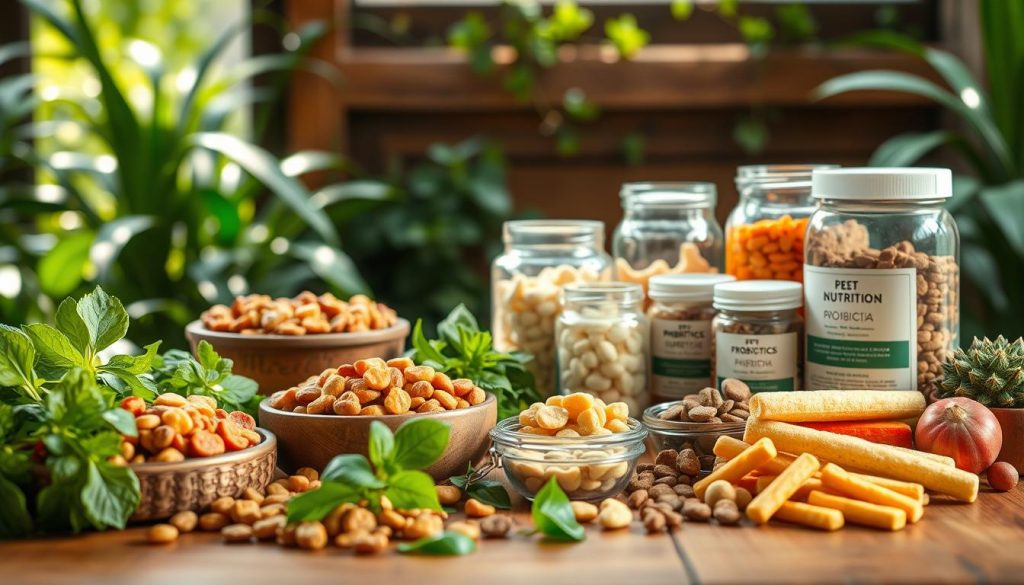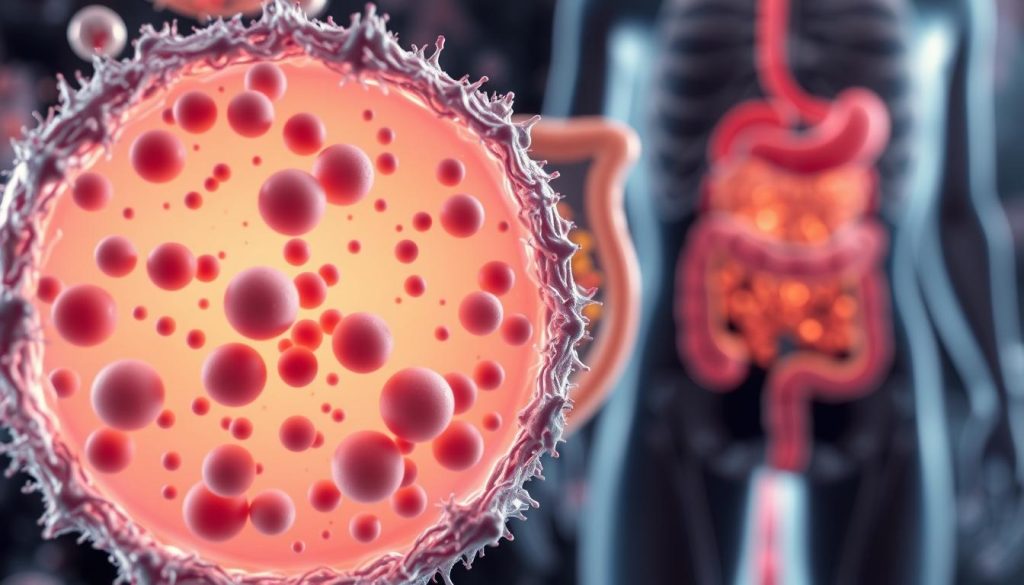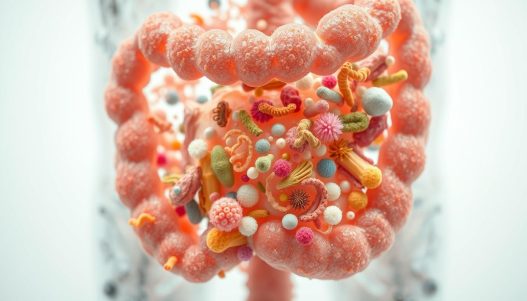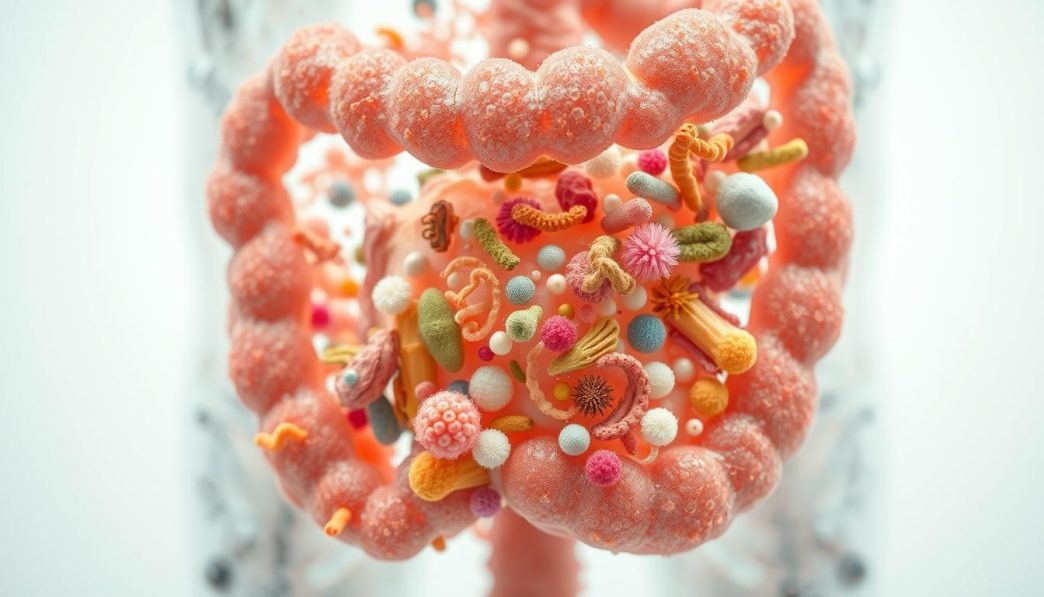The link between pet microbiome and health is growing clearer. Studies show it’s key for pets and their owners’ well-being.
A healthy pet microbiome is vital for pets. It affects digestion and immune function. It also boosts human wellness by lowering stress and fostering friendship.
Exploring the bond between animal wellness and human wellness through the pet microbiome offers insights. It helps us better care for our pets and ourselves.
Key Takeaways
- The pet microbiome plays a significant role in both pet and human health.
- A balanced pet microbiome is crucial for a pet’s overall well-being.
- The connection between pet and human health can lead to new approaches in healthcare.
- Understanding the pet microbiome can improve pet care and human wellness.
- A healthy pet microbiome can reduce stress and promote companionship.
Understanding the Microbiome: A Tiny Universe Within Your Pet
The microbiome is a tiny world inside your pet that affects their health a lot. It’s made up of trillions of tiny life forms like bacteria and viruses. They all work together in a fine balance.
What Exactly Is a Microbiome?
A microbiome is the group of tiny life forms in a certain place, like your pet’s gut. The Trillions of Microorganisms That Make a Difference are key to digestion, immune health, and even mood.
The Trillions of Microorganisms That Make a Difference
These tiny helpers keep your pet healthy. Bacteria, in particular, are well-studied. They help break down food and make vitamins.
Beyond Bacteria: Fungi, Viruses, and Other Microbes
Fungi help break down carbs, and viruses keep bacteria in check. Other tiny creatures like protozoa also play important roles.
The Composition of Your Pet’s Microbial Community
Your pet’s microbiome changes based on diet, environment, and health. For example, a pet eating a lot of fiber has a different gut than one eating a lot of protein.
How Pet Microbiomes Differ from Human Ones
Humans and pets have some similar microbiomes, but they’re not the same. Diet, gut structure, and evolution play big roles. Pets, for instance, have more bacteria for digesting meat.
The Evolution of Pet Microbiome Research
The study of pet microbiomes has grown a lot. It has changed how we see the connection between pets and their microbes. This growth has brought big steps forward in understanding pet health.
Historical Perspectives on Animal Microbiomes
At first, studying animal microbiomes was hard. But early work set the stage for today’s knowledge. Important studies focused on the gut microbiome, showing its role in digestion and health.
Breakthrough Discoveries in the Last Decade
The last ten years have brought big discoveries. We now know how important balance in the microbiome is for health. New tech has let us study microbes in more detail.
Current Research Initiatives and Funding
Now, research is looking into how to better pet health through microbiome changes. Agencies are backing studies on prebiotics, probiotics, and postbiotics. These areas show great promise for improving pet well-being.
Your Pet’s Microbiome: The Hidden Key to Both Human and Animal Wellness
Your pet’s microbiome is key to their health. It affects digestion and immune function. Understanding this complex system helps keep your pet well.
The Interconnected Web of Health
The microbiome is more than just microbes. It’s a web that affects your pet’s health. A balanced microbiome keeps the body’s functions in check.
How Microbial Balance Affects Overall Wellness
Microbial balance is crucial for your pet’s health. It supports digestion and nutrient absorption. A healthy microbiome is vital for your pet’s well-being.
Digestive Health and Nutrient Absorption
A healthy microbiome ensures your pet digests food well. It helps absorb nutrients. A well-functioning digestive system is key to overall health.
Immune System Regulation and Development
The microbiome is vital for the immune system. A balanced microbiome regulates immune responses. It protects your pet from infections.
Case Studies: Transformative Health Outcomes
Many case studies show the power of microbiome interventions. Pets with digestive issues have seen big improvements with probiotics. These stories show the impact of focusing on the microbiome in pet health.
These examples underline the role of the microbiome in pet health. They show how targeted interventions can lead to positive changes.
The Gut-Brain Connection in Pets
Understanding the gut-brain axis in pets can give us insights into their behavior and health. The gut microbiome affects their mood, behavior, and cognitive function. It’s key to their overall wellness.
How Gut Microbes Influence Behavior and Mood
The gut microbiome makes neurotransmitters and hormones that affect a pet’s mood and behavior. For example, serotonin, made in the gut, helps control mood. An imbalance can lead to anxiety and stress in pets.
Anxiety, Stress, and the Microbiome
Anxiety and stress in pets can be signs of an imbalanced gut microbiome. Pets with an imbalanced gut may act differently, like being more aggressive or fearful.
Recognizing Microbiome-Related Behavioral Changes
It’s important to spot behavioral changes linked to microbiome imbalances early. Look out for:
- Changes in appetite
- Increased anxiety or stress responses
- Compulsive behaviors
Cognitive Function and Microbial Health
Studies show the gut microbiome affects a pet’s cognitive function. A healthy gut microbiome is linked to better cognitive performance and less cognitive decline.
| Microbial Health Aspect | Impact on Cognitive Function |
|---|---|
| Neurotransmitter Production | Enhances cognitive processes |
| Inflammation Reduction | Protects against cognitive decline |
| Gut-Brain Communication | Improves mood and behavior regulation |
By understanding and supporting the gut-brain connection, pet owners can improve their pets’ well-being.
Shared Microbiomes: How Your Pet’s Health Affects Yours
The bond between pets and owners goes beyond just companionship. It also affects our health in surprising ways. We share our homes and our microbiomes with our pets. This sharing is crucial for both our health and theirs.
The Science of Microbial Transfer Between Pets and Humans
Studies show that pets and owners exchange microbes through daily contact. Microbial transfer happens through simple actions like petting or just being in the same room. These interactions can share beneficial microbes.
Daily Interactions That Share Microbes
Activities like playing with pets, sharing food, or letting them lick your face share microbes. It might seem odd, but it’s natural when living with pets. It can also boost human health.
Benefits of Living with Pets for Human Microbiome Diversity
Having pets can make our human microbiome diversity better. This can strengthen our immune system. Research shows that kids with pets may have a lower allergy risk.
Reduced Allergy Risk and Enhanced Immunity
Pets can make our microbiome more diverse. This is linked to reduced allergy risk and enhanced immunity. This is especially good for kids, helping them build a strong immune system.
Potential Health Risks and How to Mitigate Them
While there are benefits, shared microbiomes also come with health risks. For example, zoonotic diseases can be transmitted. But, we can reduce these risks by practicing good hygiene. This includes washing hands regularly and keeping pet areas clean.
Understanding how pets and humans share microbes helps us enjoy their company safely. We can do this by practicing good hygiene, keeping our pets healthy, and being aware of microbial transfer.
Diet and Nutrition: Feeding the Good Bugs
Nutrition is key to supporting the beneficial microbes in your pet’s body. A well-balanced diet can significantly enhance your pet’s microbiome health. This leads to overall wellness and vitality.
Optimal Food Choices for Microbial Health
Choosing the right food for your pet is crucial. Different species have different dietary needs.
Species-Specific Dietary Needs (Dogs vs. Cats)
Dogs and cats have distinct nutritional requirements. Dogs, being omnivores, can thrive on a varied diet. This includes both animal and plant-based ingredients. Cats, however, are obligate carnivores. They require a diet rich in protein from animal sources.
Dietary Needs Comparison:
| Nutritional Aspect | Dogs | Cats |
|---|---|---|
| Primary Dietary Requirement | Omnivorous, varied diet | Carnivorous, high protein |
| Protein Sources | Both animal and plant-based | Primarily animal-based |
Prebiotics, Probiotics, and Postbiotics for Pets
Prebiotics, probiotics, and postbiotics are vital for your pet’s microbial balance. Prebiotics are non-digestible fibers that feed beneficial microbes. Probiotics are live bacteria and yeasts that are beneficial for health. Postbiotics are the metabolic byproducts of probiotics, which also support microbial health.
Supplement Options and Their Effectiveness
When considering supplements, it’s essential to choose products backed by scientific research. Some effective options include:
- Probiotics containing Lactobacillus and Bifidobacterium strains
- Prebiotic fibers like inulin and fructooligosaccharides
- Postbiotic supplements that contain beneficial metabolites
Avoiding Ingredients That Harm Beneficial Microbes
Some ingredients in pet foods can harm beneficial microbes. It’s crucial to avoid foods containing excessive preservatives, artificial additives, and certain chemicals. These can disrupt microbial balance.

By making informed dietary choices, you can significantly support your pet’s microbiome health. This contributes to their overall well-being.
Environmental Factors Affecting Your Pet’s Microbiome
The environment greatly shapes your pet’s microbiome. Many external factors can change the balance and variety of microbes in and around your pet.
The Impact of Urban vs. Rural Living
Living in the city or the countryside affects your pet’s microbiome. City pets are exposed to different microbes than country pets. City pets may have less diverse microbiomes because they see fewer natural environments.
Household Cleaning Products and Microbiome Health
Cleaning products can upset your pet’s microbiome balance. Harsh chemicals in these products can kill good microbes, causing dysbiosis.
Pet-Safe Alternatives for a Microbiome-Friendly Home
Choosing pet-safe, eco-friendly cleaning products is key. Look for products that are non-toxic and biodegradable.
The Importance of Natural Environmental Exposure
Being in nature is vital for a healthy microbiome. Letting your pet explore outdoors can increase their microbial diversity.
Understanding and managing these environmental factors helps support your pet’s microbiome health.
Common Microbiome Imbalances and Their Symptoms
Microbiome imbalances in pets can show up in many ways. They can affect a pet’s digestion, skin, and immune system. These issues happen when the balance between good and bad bacteria is off. Knowing the signs is key to helping your pet.
Digestive Issues and Dysbiosis
Digestive problems are a common sign of microbiome imbalances in pets. Dysbiosis, or an imbalance in gut bacteria, can cause diarrhea, constipation, and gas. Spotting the signs of gut imbalance early is important.
Identifying Warning Signs of Gut Imbalance
Look out for changes in appetite, vomiting, and belly pain. If your pet shows these signs, see your vet right away. Early treatment can make a big difference in your pet’s life.
Skin Conditions Related to Microbial Imbalance
Skin issues like itching, redness, and hot spots can point to microbiome imbalances. 
Keeping gut bacteria in balance is key to healthy skin. A balanced diet and supplements can help.
Immune System Dysfunction and Allergies
A healthy microbiome is vital for a strong immune system. When it’s off, pets may get sick more easily and have allergies. Pets with imbalances may get infections and have allergic reactions.
Helping your pet’s microbiome through diet and lifestyle can boost their immune system. This can lower allergy risks.
Practical Steps to Support Your Pet’s Microbiome
As a pet owner, you can greatly affect your pet’s microbiome. Simple changes in your daily habits can help. This can lead to a balanced and healthy microbial community.
Daily Habits That Promote Microbial Health
Creating a routine that supports microbial health is key. Focus on exercise and stress reduction to improve your pet’s well-being.
Exercise and Its Impact on Microbiome Diversity
Exercise boosts microbiome diversity by growing good microbes. Walking, running, or playing fetch are great. Try to exercise for at least 30 minutes a day. Mix up activities to keep things fun.
Stress Reduction Techniques for Microbial Balance
Too much stress can upset your pet’s microbiome. This can lead to health problems. Massage, meditation, or just spending time with your pet can help. You can also use calming aids like pheromone diffusers or treats.
When to Consider Microbiome Testing
If you worry about your pet’s microbiome, talk to your vet about testing. This can spot any imbalances or issues.
Working with Your Veterinarian on Microbiome Health
Your vet is a great resource for microbiome health. They can guide you on the best steps. They’ll help create a plan that fits your pet’s needs.
By working with your vet and adopting healthy habits, you can support your pet’s health. This can lead to a long, happy life for your pet.
Conclusion: A New Frontier in Pet and Human Health
Learning about the link between your pet’s microbiome and health is changing how we care for animals and people. It shows how important it is to keep a balance in our microbiome. This balance is key for both pets and humans.
Looking ahead, microbiome research is full of hope for better lives for pets and their owners. By making smart choices about your pet’s diet and lifestyle, you boost their health. This also helps create a healthier space for everyone around them.
The study of microbiomes is set to reveal more exciting findings about how pets and humans are connected. This will help us find ways to live in harmony with each other.






